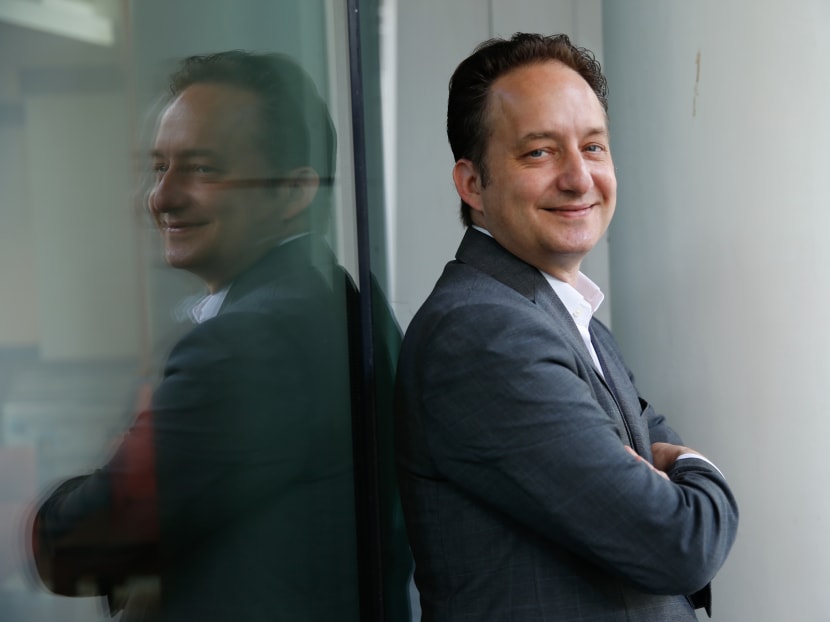Yale-NUS prides itself on keeping debates civil: Outgoing president
SINGAPORE — Having a debate, yet keeping it civil, is a slice of Yale-NUS College that Professor Pericles Lewis, its outgoing president, hopes to take back to the United States, where political discourse has tended in recent times to veer into conflict.

(Center) Professor Pericles Lewis, 48, the founding president of Yale-NUS College. Photo: Najeer Yusof/TODAY
SINGAPORE — Having a debate, yet keeping it civil, is a slice of Yale-NUS College that Professor Pericles Lewis, its outgoing president, hopes to take back to the United States, where political discourse has tended in recent times to veer into conflict.
This ability to have civil discussions is partly why the liberal-arts college has been successful, Prof Lewis, 48, said in an interview ahead of the college’s inaugural graduation ceremony later this month.
He said the US has found it tougher keeping debates civil, especially in the past election year, where “a lot more conflict” has tended to figure in political matters.
And keeping debates respectful was an attribute he admired about Singapore. “Our students are very good at having a debate but keeping the discourse civil,” he said.
Appointed Yale-NUS’ founding president in 2012, Prof Lewis will return to Yale University in July as its deputy provost for international affairs and vice-president for global strategy. Veteran historian Professor Tan Tai Yong will succeed him.
Prof Lewis said employers who have taken on Yale-NUS students for internships have noted how they are “a little more direct, and willing to contribute and make a statement” than the average student. They also tend to be articulate and can solve problems creatively.
Although Yale-NUS has made good strides in areas such as drawing high-calibre faculty, staff and students, and shaping a “distinctive and ... high-quality” curriculum, he acknowledged that some misperceptions still hold.
For instance, some may not know that Yale-NUS has a strong science programme, assuming that a liberal-arts education excludes the sciences.
“That’s why often I say ‘liberal arts and science’ just to make that clear to people,” said Prof Lewis.
He believes that this misconception will be corrected as the college’s science majors fan out to do doctorate degrees in universities such as Harvard or Yale, or pursue research at the Duke-NUS Medical School.
Students who pursue science at Yale-NUS get the “breadth” not otherwise seen in other institutions, he noted. Many scientists have told him that, often, those who make the largest advances in research are those who have had “broader exposure” – focusing not only on their “narrow slice”, but also other sciences and the “social and human dimensions” of their work.
He said Yale-NUS will press on with its outreach to the public, including parents, on what a liberal-arts and science education entails.
Prof Lewis said it is important “now more than ever” for students to receive a broad education that allows them to think critically not only on social and political issues but “the future of the world”.
The liberal arts and sciences allow students to learn from academics across various disciplines, he said. Yale-NUS’ full residential programme also enables students to “develop holistically” rather than focus exclusively on their studies.
He is confident of the job prospects for liberal-arts graduates, who could go into fields such as finance and consulting, the arts and government. Others will choose to pursue research or graduate programmes.
Prof Lewis also brushed aside as “a little bit imprecise” recent reports citing Yale-NUS’ 5-per-cent acceptance rate last year as being lower than that of other Ivy League colleges, including Harvard.
“You shouldn’t judge how hard a college is to get into just by the percentage of students who get in. 1 or 2 per cent doesn’t make a difference.”
Saying that it was difficult to land a spot in any such college, he added: “It’s not really reflective of the essential question, which is ‘how good are the students whom you actually wind up enrolling’? And the answer is we enrol excellent students.”
When pressed on the perception that it was hard to secure a spot at Yale-NUS, Prof Lewis said the college was a small one.
“To deliver the kind of education we want to deliver, it needs to be a small college. We could imagine growing a little bit, but we’re about the size we intended to be.”
From August next year, the college aims to take in 250 students yearly, an increase from the 200 or so students it accepted last August. “That’s, unfortunately, all the space that we’ve so then we just try to select the best students among the many qualified applicants,” he said.
On the college’s ability to ensure freedom of expression, Prof Lewis said that while some had raised questions initially, none of the problems had surfaced “for the most part”, and the college was “very happy” with the situation.
It has hosted a wide range of Opposition speakers, and those who speak on issues such as migrant workers and lesbian, gay, bisexual and transgender matters.
On the other hand, it has invited the “more mainstream” and government speakers.
“We’re not only on one side. We represent the whole range of opinion,” he said, adding that the college also has an active student newspaper, The Octant, which at times suggests different ways of doing things.
About 120 students from its inaugural cohort will graduate on May 29. More than half of them already have plans fixed after graduation, including jobs and graduate studies, said Prof Lewis.








